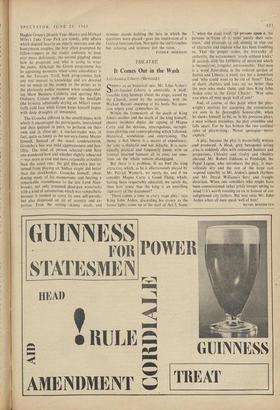THEATRE
It Comes Out in the Wash
Left-handed Liberty. (Mermaid.) 1 as an historical epic, Mr. John Arden's
1L-1;anded Liberty is admirable. A bluff, irascible king bouncps about the stage,, teased by the Church, taxed by the economy, with the Wicked Barons snapping at his heels. No ques- tion where your sympathies lie.
Within the framework of the death of King John's mother and the death of the king himself, chosen incidents depict the signing of Magna Carta and the devious, unscrupulous, surrepti- tious plotting and counterplotting which followed. Historical, scandalous and entertaining. The theme is that liberty is a matter of expediency; the tone is dialectic and not didactic. It is occa- sionally poetical and freqtiently funny with an ironical inverted humour all its own; our emo- tions on the whole remain disengaged.
But there is a problem. If we find the king attractive, which, as he is affectionately played by Mr. Patrick Wymark, we surely do, and if we consider Magna Carta a Good Thing, which, having been respectably educated, we surely do, then how' come that the king is an unwilling signatory of the document?
`There comes a time in every stage play,' says King John Arden, discarding his crown as the house lights come up at the start of Act 3, Scene
7, 'when the stage itself, the persons upon it, the persons in"front of it, must justify their exis- tence,' and proceeds to our.. dismay to step out of character and e'x'plain what has been troubling us. That- the proper order, the hierarchy of authority, the astronomers' circle without kinks,' ill accords with the fallibility of mankind which is 'inconsistent, irregular, unreasonable.' That man is a weed flourishing in the ordered garden of Justice and Liberty; a weed, yes, but a dandelion and 'who could want .to be rid of them?' That, in short, charters and laws are no better than the men who make them, and thus King John Arden cries to the Great Charter: 'Woe unto you when all men speak well of you!'
And, of course, at this point when the play- wright's motives for accepting the commission are seen to be thoroughly honourable, when he shows himself fo be,-as in his previous plays, a man without prejudice, the play crumbles and falls apart. For he has broken the two cardinal rules of playwriting: 'Never apologise—never explain.'
A pity, because the play is masterfully written and produced. A bleak, grey hexagonal acting area is suddenly afire with coloured banners and projections. Chivalry and rivalry and ribaldry abound, Mr. Robert Eddison as Pandulph, the Papal Legate, who introduces the play; is mar- vellously dry and the rest of the large cast respond superbly to Mr. Arden's speech rhythms and Mr. David Williams's fiery and fraught direction. When one considers who might have been commissioned (what grisly images spring to mind!) it's worth roasting an ox in honour of our enlightened city fathers. But woe unto Mr. John Arden when all men speak well of him!
DAVID BENEDICTUS






































 Previous page
Previous page